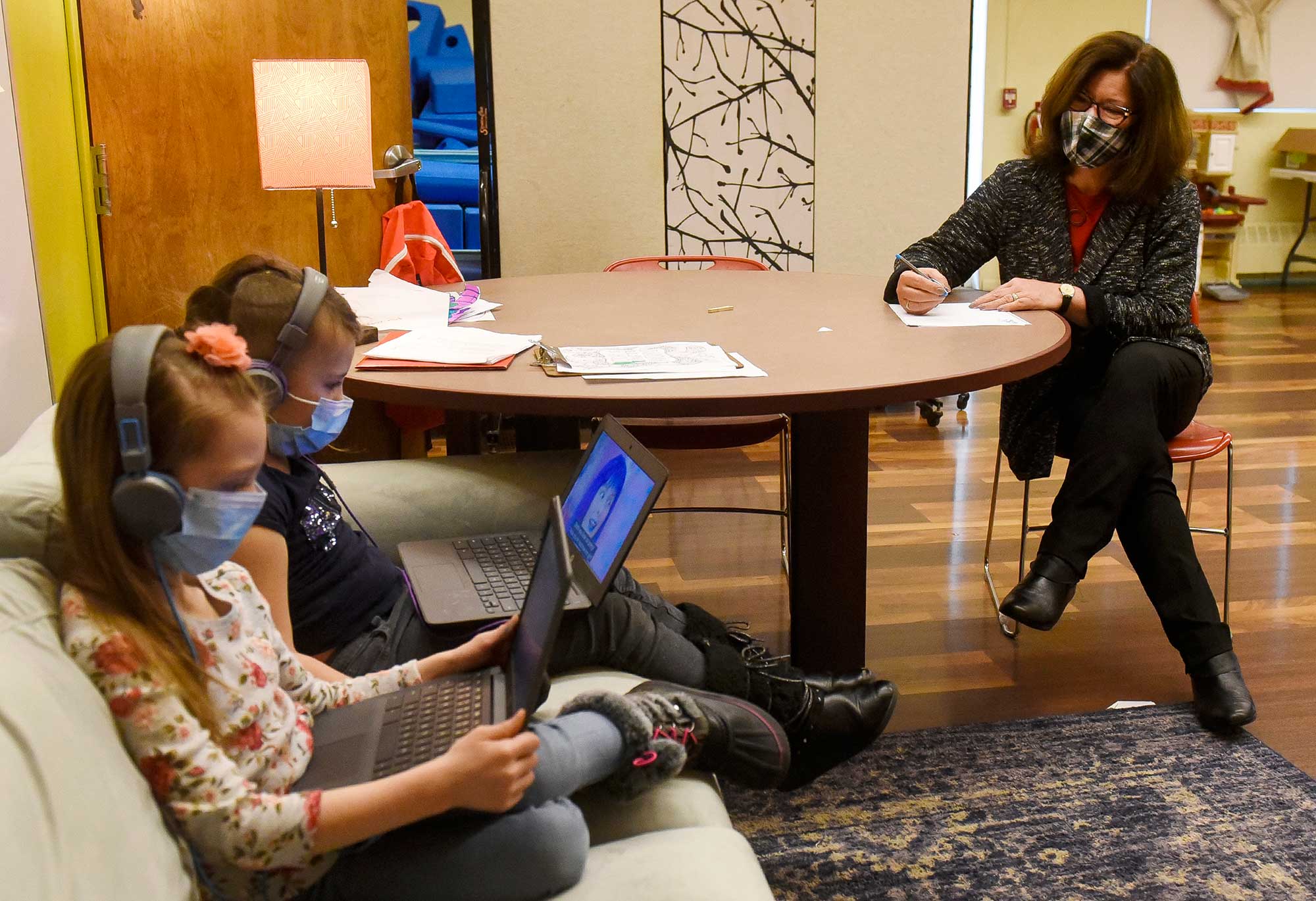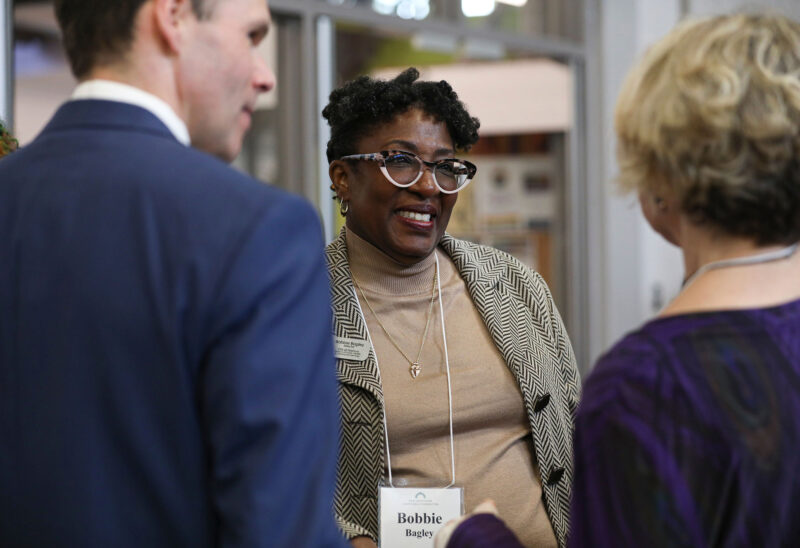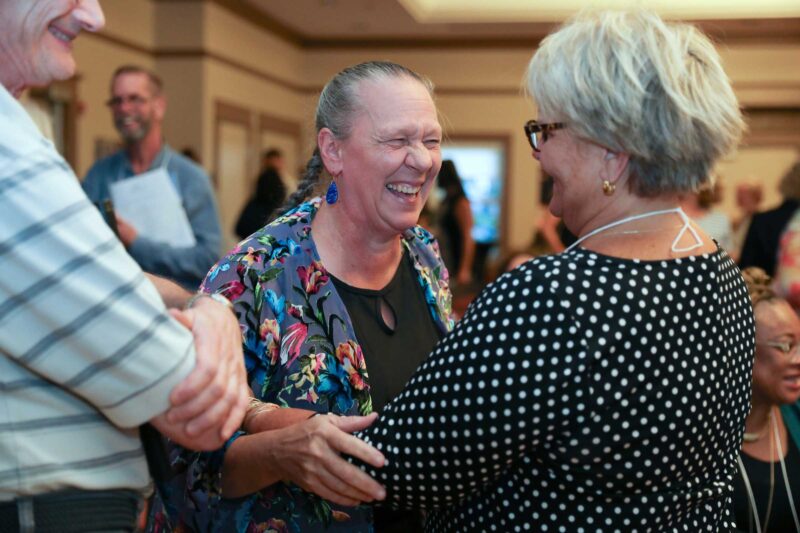Jess Cummings had just started a new job when COVID hit. Her six-year-old’s school closed initially, then went to a hybrid model for kindergarten. Jess is a Head Start teacher, a job she was still required to do in-person — so that the parents of the preschool-age children she teaches can, in turn, go to work doing other essential jobs in the community. She could not manage Keira’s remote schooling from home.
Girls, Inc. has provided this family — and many others in similar circumstances — with a lifeline during incredibly challenging times.
The nonprofit, which provides girls ages 5-18 with a variety of programming year-round, quickly shifted its operations at its centers in Manchester and Nashua. The centers had been the site of mostly after-school programming, and were equipped with only a couple computers — and unreliable wi-fi. They were converted in a matter of weeks to add remote-learning “Smart Cafes” for pandemic times, fully wired and equipped with computers for girls to use for remote learning, PPE and partitions for safety, new staff to help guide girls in their school work and a ramped-up meals program to feed kids a nutritious breakfast, lunch and dinner. They switched from being open after-school only to opening in the early morning, so parents could drop girls off before work.
“When schools opted for remote learning, we thought, ‘what is the best way to fulfill our mission and serve families?’ That is where the Smart Cafés came about,” said Girls, Inc. CEO Sharron McCarthy. “Families really needed the help, and we didn’t want girls to struggle or be home alone.”
Jess drops Keira at the Girls, Inc. location in Nashua every school day at 7:45. Staff there help Keira sign on to her computer to connect with her class, and help guide her through her school work. And when school is over, they switch into “after-school” mode (Girls, Inc. has long provided afterschool programming) and Keira stays with the same group and participates in activities until her mom collects her at 5. (Even though Keira’s school does offer in-person learning, after-school care remains complex, and would involve her ‘bubble’ being much larger.)
“I really feel like they’ve got my back,” Jess said of Girls, Inc. “Keira loves it there, she loves her ‘teachers,’ she cannot wait to get there every day.”
A grant from the Foundation in the early days of the pandemic helped Girls, Inc. make the leap to being able to provide what families needed in that moment. Foundation staff reached out to a donor with tech expertise, who recommended a grant from his donor-advised fund to support the Smart Cafes, raised another $10,000 among his own friends and colleagues for new computers, and then helped the nonprofit with purchasing the machines in bulk. The wider community also rallied: BEI Networks rewired both locations with high-speed internet, gratis; BAE Systems and Dartmouth Hitchcock provided more Chromebooks and supplies — and more. Earlier this year, the Foundation made a three-year, $60,000 operating grant to support all of the work of Girls, Inc. in New Hampshire. Other Foundation donors have also been longtime, generous supporters of Girls, Inc.
Girls, Inc. is a nationwide organization that focuses on inspiring girls to be strong, smart and bold. Sixty percent of the families served by Girls, Inc. in New Hampshire come from households with incomes of $25,000 or below. Most girls live with one parent, and a high percentage of those parents have jobs that have required them to work outside the home throughout the pandemic. Many work in health care, child care, as cleaners or in restaurants. Many families do not have computers or internet access at home — making remote learning at home impossible. Some parents, who speak languages other than English, struggled to oversee their children’s daily lessons.
Like most parents managing remote and hybrid learning, the Girls, Inc. staff members are not certified teachers, and — also like parents — they are doing their best. On any given day, staff might be helping girls with everything from metric conversion to lessons about the solar system to New Hampshire history and chapter-book assignments — and making sure everything is completed and ready to be turned in on time.
For parents like Jess Cummings, that has made a very stressful time a lot easier.
“I love being a working woman,” she said. “I want to work. I am thankful that Girls, Inc. can provide this. They have been my saving grace.”










![Rev. Heidi Carrington Heath joined Seacoast Outright. [Photo by Cheryl Senter]](https://www.nhcf.org/wp-content/uploads/2024/05/Heidi-Carrington-Thumbnail-800x548.jpg)
![Dr. Jennie Hennigar treats a patient at the Tamworth Dental Center [Photo by Cheryl Senter]](https://www.nhcf.org/wp-content/uploads/2024/05/TCCAP-Hero-800x548.jpg)






